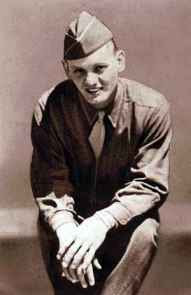Private Eddie Slovik
Edward Donald Slovik (February 18, 1920 – January 31,1945) was a private in the United States Army during World War II and the first American soldier to be executed for desertion since the American Civil War.
Although over twenty-one thousand soldiers were given varying sentences for desertion during World War II – including forty-nine death sentences – only Slovik's death sentence was carried out.
Slovik was born in Detroit, Michigan. As a minor, he was arrested several times; the first time, when he was twelve, occurred when he and some friends broke into a foundry to steal some brass. Between 1932 and 1937, he was caught for several incidents of petty theft, breaking and entering and disturbing the peace. In October 1937, he was sent to jail and paroled in September 1938. After stealing and crashing a car with two friends while drunk, he was sent back to jail in January 1939.
In April 1942, Slovik was paroled once more and obtained a job at the Montella Plumbing Company in Dearborn. There he met his wife Antoinette Wisniewski, whom he married on November 7, 1942. They went to live with her parents. Slovik's criminal record had led him to be classified as unfit for duty in the U.S. military ("4-F"), but, shortly after his and Antoinette's first wedding anniversary, Slovik was reclassified as fit for duty ("1-A") and subsequently drafted by the Army.
Slovik arrived at












